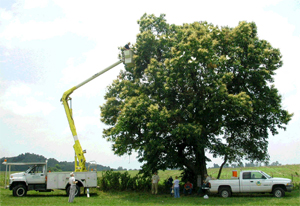
Among the last of a proud breed, this Castanea dentata, or American chestnut, stands alone in a Kentucky field. It is one of the very few mature flowering chestnuts that has so far eluded the fungal disease known as chestnut blight. What you see in the picture is a tree so valuable that it is hand-pollinated by a botanist in a cherry picker. The botanist in the bucket is doing what he can to resurrect the old tree for posterity. I wish him luck.
When it comes to endangered species, the American chestnut is the botanical version of charismatic megafauna. Charismatic megafauna, those large and tragic beautiful animals like lions and gorillas, are the spokesmodels of extinction threat. The Tecopa pupfish can leave the stage unnoticed, but we can’t help but empathize with the plight of the Siberian tiger. Equally tragic and majestic is the mighty American chestnut. Call it charismatic megaflora. At one time it dominated the old-growth forest canopy in the Appalachians. And in a single generation it was gone. Or very nearly so.
The American Chestnut Foundation is dedicated to bringing back a blight-resistant version of the chestnut. As part of their campaign, ACF publications director Jeanne Coleman asked for letters from people who grew up in the shadow of the old chestnuts, people who can testify to what the trees looked like in their prime. My father is one of those people. And he sent Jeanne Coleman a letter. But Jeanne Coleman never wrote back.
So, as a public service on behalf of my father and his trees, I am posting the letter.
American Chestnut Foundation
P. O. Box 4044 Bennington, VT 05201Dear Ms. Coleman,
In the late 1920’s and the early 1930’s I lived in a village, Crozet, at the foot of the mountains north of Charlottesville, Va. The mountains were beautifully green with great chestnut trees that marked our seasons.
In the autumn we waited for the excitement of the first frost and opening of the bur. Trips up the mountain brought home baskets of chestnuts that had that distinctive sweet firmness that lingers in memory. The fun and the flavor mingled.
This was especially true with the smaller chinquapins. I could collect a pocket full on my way to school and have a days worth of good eating as well as a supply of missiles that bedeviled the girls.
Of course those days preceded anyone’s idea of air conditioning other than a breeze through an open window. I would sleep with my head close to the window and enjoyed the panorama of the mountain. It was a great shock to see a line of brown moving day by day across the mountain. The concept of the blight was difficult for a boy to grasp and it took a considerable period of time for me to understand the inexorable march of destruction I was witnessing. I could not believe our chestnut trees would not come back.
My feelings were mixed in a way that a boy has difficulty expressing. They were a mixture of disbelief and vague grief that persist to this day. Mixed with this of course was that gift of the human spirit, hope.
I celebrate the persistent energy of the American Chestnut Foundation. I anticipate the day when my nostalgia blends into warm pleasure at your success—and the blacksmith can enjoy the shade.
Very truly yours,
Marcus M. Gulley, MD
As a footnote to this letter, I observe that the ACF describes in their FAQ two weevils that attack the chestnut. They are known as the “lesser” and the “greater”. To think, with that setup, that they attempt no joke about the lesser of two weevils… Oh the humanity! First they scorn my father’s letter, and then they forbear to use a perfect weevil-related punchline. Truly they are squandering riches.
Ned,
How dare you put that link on your blog: from the title of the question, I felt sure I was I was reading a treatise on the clinical management of elephantiasis!
Capt. Jack Aubrey had them beat by about 200 years:
“He who would pun would pick a pocket!”
Anyone puzzled by Mike O’s comment may wish to refer to the wording of question 7 in the FAQ. Ahem.
You warm my heart. D